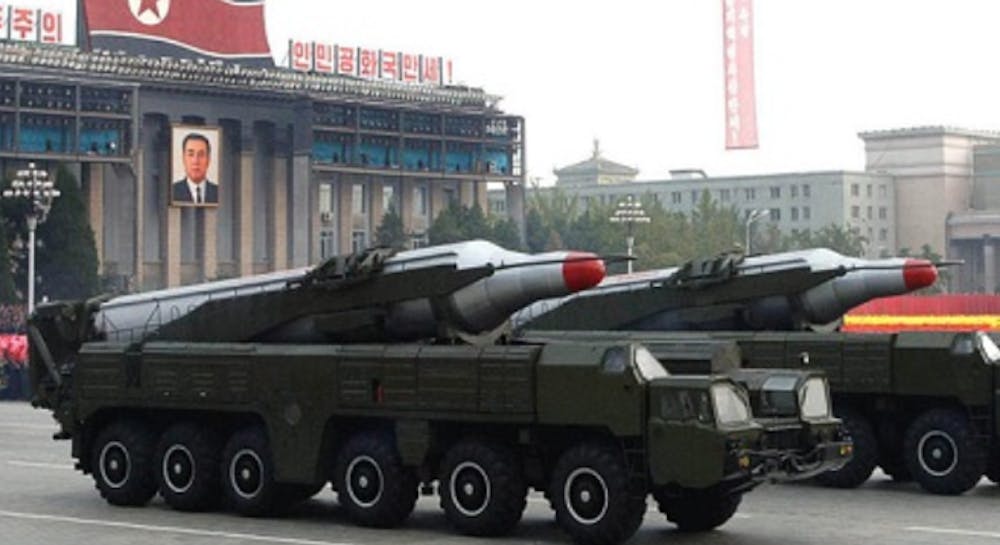In recent weeks, North Korea has stolen the national spotlight due to its conduction of multiple missile tests into the Sea of Japan. Recently, Vice President Mike Pence declared the policy of “strategic patience” a “failed policy,” signaling a fundamental shift in how the United States deals with North Korea. Unsurprisingly, this radical change in dealing with North Korea has sparked significant interest among the American public, and the possible outbreak of war has been brought up by multiple media sources. While worrisome, North Korea’s actions are no different from decades of pre-established behavior — if anything, the Trump administration has only exacerbated such war hysteria through its ineptitude and infighting.
Historically, North Korea has conducted far more dangerous actions against the United States and its allies. In 1968, North Korea seized the USS Pueblo, holding its crew captive for 11 months. In 1998, North Korea launched a missile into Japanese airspace, and in 2010, 18 South Koreans were wounded and two killed after North Korea bombarded the island of Yeonpyeong with around 100 rounds of artillery. However, as noted by Robert Kelly, Associate Professor at Pusan National University, the idea of “retaliating against North Korea has, of course, been around for a long time … Yet, in each case, the U.S., South Korea and Japan chose to defer.” Furthermore, the United States is limited in any action it can take for a multitude of reasons: Most importantly, Seoul is well within the range of North Korean missile fire. Any actions taken by the United States against North Korea risk disapproval by South Korea, Japan and China. Conducting preemptive strikes would undoubtedly lead to a full war, with casualties potentially rivaling those of World War II and creating a massive refugee crisis.
In addition, South Korea’s impeachment of former president Park Geun-hye will undoubtedly cause a realignment of South Korea’s policies towards North Korea. The upcoming 2017 South Korean presidential election currently has Moon Jae-in of the Democratic Party of Korea and Ahn Cheol-soo of the People’s Party in overwhelming leads compared to all other candidates. Both, however, are likely to disrupt current U.S. foreign policy towards North Korea — as reported in an article by journalist Tim Shorrock, “both Moon and Ahn expressed strong opposition to a unilateral U.S. pre-emptive strike and emphasized that South Korea must play a lead role in any dealings with North Korea or China ... That will likely force a change in Trump’s policy, away from confrontation and back to the combination of sanctions and military strength emphasized by the Obama administration.”
For all the bluster presented by the Trump administration, U.S. policy towards North Korea remains remarkably unchanged. On April 14, the Associated Press reported that the “Trump administration has settled on its North Korea strategy after a two-month review: ‘Maximum pressure and engagement.’” As noted by the AP, “[the Trump administration] settled on a policy that appears to represent continuity … A U.S. military official, who requested anonymity to discuss planning, said the U.S. doesn’t intend to use military force against North Korea in response to either a nuclear test or missile launch,” though such a policy could change if North Korea targeted South Korean, Japanese or U.S. territory.
North Korea’s recent missile tests has placed the United States in a precarious situation, unable to take any action without advice and consultation from Japan, China or South Korea — all of which are in close proximity to North Korea. Though recent events are no doubt unsettling, any drastic changes made by the United States in dealing with North Korea would threaten the valuable relationship between the United States and China and South Korea and Japan. The Trump administration has claimed “strategic patience” has failed the United States; however, its actions have indicated that, if anything, it will continue the policy of “strategic patience” under the guise of “maximum pressure and engagement.”
William Wong is an Opinion columnist at The Cavalier Daily. He can be reached at opinion@cavalierdaily.com.







